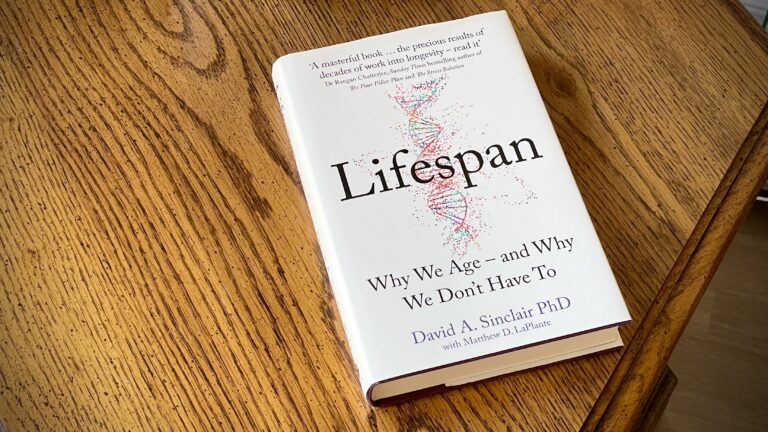In “Lifespan: Why We Are and Why We Don’t Have to“, David A. Sinclair takes readers on a captivating journey through the latest research on longevity. This book challenges the notion that aging is an inevitable process, presenting it instead as a treatable condition caused by a loss of information. Join me as I delve into the thought-provoking ideas presented in this book and explore its implications for our understanding of aging and the potential for a longer and healthier life.
Exploring Aging as a Treatable Condition
Sinclair’s book revolutionizes the way we perceive aging by presenting it as a disease rather than a natural consequence. He argues that if we can address the underlying causes of aging, it may be possible to not only alleviate its symptoms but also extend our healthspan significantly. This paradigm shift opens up exciting possibilities for medical advancements and interventions that target the root causes of aging.
Revolutionizing Longevity Research
David Sinclair sheds light on the serendipitous nature of past discoveries in the field of longevity. However, intentional research efforts could lead to groundbreaking advancements. The field of aging research is buzzing with numerous ideas, and even if only a fraction of them prove successful, they have the potential to revolutionize our understanding of aging and transform how we approach longevity.
Video Review: Lifespan
Ethical Considerations and Organ Shortage
A Thought-Provoking Conundrum: Organ Transplants and Self-Driving Cars
One intriguing topic raised in the book is the potential impact of self-driving cars on organ availability. As traffic accidents decrease, the traditional source of organs from crash victims may dwindle. This ethical dilemma forces us to confront the need for alternative solutions and consider the broader implications of a changing landscape in organ transplantation.
Aging and Inequality
Headline: The Link between Longevity and Wealth
Sinclair addresses the concerning issue of growing inequality due to disparities in longevity. The rich, who tend to live longer, have an opportunity to accumulate more wealth, creating a cycle of increasing disparity. This examination of the socioeconomic implications of extended lifespans prompts us to reflect on the importance of ensuring equal access to healthspan-extending interventions for all.
Activating Our Survival Mechanisms
Unlocking Our Body’s Potential for Longevity
The book encourages us to tap into our body’s innate survival mechanisms to promote longevity. By engaging these mechanisms, even in the absence of real adversity, we may unlock the ability to extend our lifespans significantly. It poses thought-provoking questions about the best ways to activate these mechanisms and prompts further exploration into the potential strategies for increasing healthspan.
Personal Reflections and Actions
Embracing a Longer Life
I found myself captivated by the possibility of a longer and healthier life. The book resonates with me. Inspired by the research, I have embraced intermittent fasting (16:8/18:6) as a practice likely to promote longevity. Surprisingly, it has not only been beneficial for my health but has also freed up valuable time in the mornings.
Book Verdict and Rating
An Eye-Opening and Inspiring Read
Lifespan is a book that challenges conventional wisdom and sparks conversations about the future of aging and longevity. While its overly optimistic outlook can be slightly overwhelming, the book’s importance and thought-provoking nature cannot be denied. I rate it as one of the most significant and inspiring reads of the year.
⭐️ ⭐️ ⭐️ ⭐️ out of 5
Find more great books to read on my the Great Books List
Video Reviews every week on YouTube and support the BookLab mission on Patreon
“Lifespan” presents the idea that aging is not an inevitable process but a treatable condition caused by a loss of vital information. The book explores the potential to extend healthy lifespans by addressing the underlying causes of aging.
Sinclair highlights that aging is a disease, separate from death, and proposes interventions that target the root causes of aging. He also emphasizes the need for intentional research efforts to discover molecules promoting longevity, rather than relying on serendipitous discoveries.
Yes, “Lifespan” touches on ethical concerns, such as the potential shortage of organs for transplantation as self-driving cars reduce traffic accidents. Sinclair raises thought-provoking questions about the social implications of extended lifespans and the need for equitable access to healthspan-extending interventions.
The book encourages readers to engage their body’s survival mechanisms, even without real adversity, to push the boundaries of human lifespan. It promotes practices like intermittent fasting as potential longevity-promoting strategies. “Lifespan” motivates individuals to embrace a longer and healthier life.



